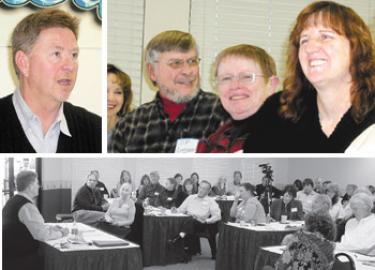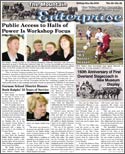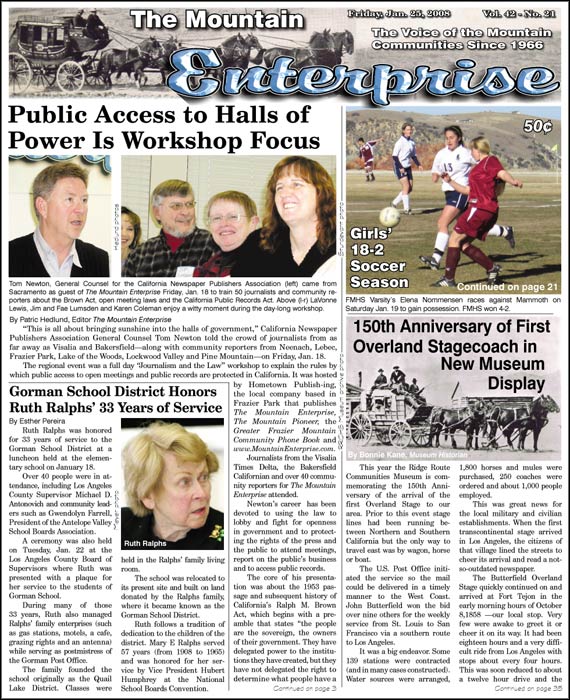
Tom Newton, General Counsel for the California Newspaper Publishers Association (top left) came from Sacramento as guest of The Mountain Enterprise Friday, Jan. 18 to train 50 journalists and community reporters about the Brown Act, open meeting laws and the California Public Records Act. Top right (l-r) LaVonne Lewis, Jim and Fae Lumsden and Karen Coleman enjoy a witty moment during the day-long workshop. Below, the room was filled to capacity with Mountain Enterprise staff, professional and over 40 community reporters.
By Patric Hedlund, Editor The Mountain Enterprise
"This is all about bringing sunshine into the halls of government," California Newspaper Publishers Association General Counsel Tom Newton told the crowd of journalists from as far away as Visalia and Bakersfield—along with community reporters from Neenach, Lebec, Frazier Park, Lake of the Woods, Lockwood Valley and Pine Mountain-on Friday, Jan. 18.
The regional event was a full day "Journalism and the Law" workshop to explain the rules by which public access to open meetings and public records are protected in California. It was hosted by Hometown Publishing, the local company based in Frazier Park that publishes The Mountain Enterprise, The Mountain Pioneer, the Greater Frazier Mountain Community Phone Book and www.MountainEnterprise.com.
Journalists from the Visalia Times Delta, the Bakersfield Californian and over 40 community reporters for The Mountain Enterprise attended.
Newton’s career has been devoted to using the law to lobby and fight for openness in government and to protecting the rights of the press and the public to attend meetings, report on the public’s business and to access public records.
The core of his presentation was about the 1953 passage and subsequent history of California’s Ralph M. Brown Act, which begins with a preamble that states "the people are the sovereign, the owners of their government. They have delegated power to the institutions they have created, but they have not delegated the right to determine what people have a right to know."
The right to know creates a presumption that cities, counties, water boards, school boards and the local agencies and advisory bodies they create shall hold open meetings and that the public shall be properly given advance notice about those meetings and what is to be talked about there.
Such an important concept to maintaining the well-informed public necessary for true democracy has not been without struggle.
For the 55 years of the Brown Act’s existence, "there has been an ongoing tension between the public’s right to know and the agencies’ desire for efficiency and (at times) government’s attempt to avoid public embarrassment," Newton said. "That tension goes on today," he added.
He also spoke about the Bagley-Keene Open Meeting Act of 2004 that covers all state boards and commissions. Generally, it requires these bodies to publicly notice their meetings, prepare agendas, accept public testimony and conduct their meetings in public unless specifically authorized by the Act to meet in closed session.
Narrowly tailored exceptions to allow limited closed sessions "to protect the public purse" have been added to the Brown Act, but "public bodies should never go behind closed doors to prevent embarrassment or for political expediency," Newton emphasized. The people elected to these bodies are responsible for adhering to these meaningful rules despite numerous temptations to "game" the system, for instance with "serial or daisy chain meetings between members of the board or agency administrators, emails and ‘retreats’ outside of the public eye."
Numerous resources for the public were suggested, including the California First Amendment Corporation’s www.cfac.org and www.calaware.org.
The questions asked during the event were insightful.
"This was the first time in 18 years of giving these trainings that we have had such an attendance with such great enthusiasm for these issues," Newton said in his closing remarks.
Jim Lumsden of Lebec, wrote afterward, "The seminar was a tremendous success.
I hope [The Mountain Enterprise] staff take to heart Tom’s closing comments regarding the enthusiasm of the attendees. I have watched The Mountain Enterprise grow over the past several years based on the scope and quality of the reporting.
"You are truly ‘moving mountains.’"
The community reporters program is an ongoing series of seminars being developed by The Mountain Enterprise to provide specific skills to the many Mountain Community residents who contribute to our community newspapers by reporting, writing and providing news tips.
This is part of the January 25, 2008 online edition of The Mountain Enterprise.
Have an opinion on this matter? We'd like to hear from you.


